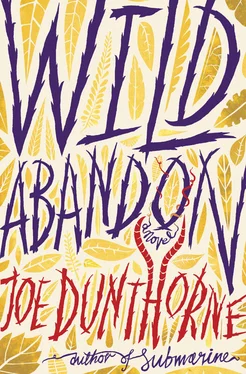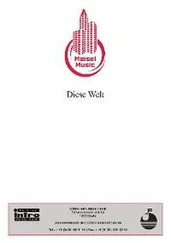“So wait … you live in The Rave House?”
“Yes. The Rave House.”
The term had been coined after Kate’s fifteenth birthday when she had asked that her usually wholesome birthday tradition (a day at Three Cliffs Bay, swimming, eating, and playing an all-community game of rounders) be scrapped in favor of hiring a decent outdoor sound system. It was all pretty low-key — playing tunes from a box of old records they’d found in the attic — until the noise had attracted a group of teenagers from Hill End campsite. The teenagers made some calls to their older brothers and sisters. About two in the morning, a convoy of souped-up cars came up the lane, chained together by their headlights. Kate was excited to have her birthday sanctified by the presence of older boys and girls. She made a deal with her parents that if the party moved into the barn, they could keep it going. There followed nearly twelve hours of unfashionable but undeniably hea vee drum and bass while the adults remained besieged in the big house. She went with one of those older boys to the flattened grass in a clearing behind the barn. The boy’s erection, softened by drugs, made for a kind of beginner’s erection. Plus, she suspected that the vibrations from the subs helped. That she enjoyed losing her virginity, she had since discovered, made her rare. By lunchtime the next day, the ravers had fallen asleep: in polytunnels, in Don and Freya’s bed, among the baby leaf salads, and next to the bonfire, their hair too hot to touch. Over the following weeks, tales began to emerge online of relentless debauchery, of parental absenteeism, of meatless barbecues at … The Rave House .
Without Kate noticing, Geraint had taken them on a detour through Three Crosses. He pulled up in front of a link-detached house, set back from the road, with vines climbing the front.
“So guess where I live,” he said somberly.
She examined the house. Again, she was annoyed with herself — with her upbringing — for her disapproval of the heptagonal plastic conservatory, so she said, “I really like your conservatory.” The house had a garage, which was open, and inside there was an old-style Jeep that looked almost military.
“My dad’s into vintage four-by-fours,” he said.
While she was still wondering how to respond, he drove onward to the community. Fifteen minutes later, as they got near, Geraint slowed at the top of the lane to observe the wonkily wood-cut sign, BLAEN-Y-LLYN, and the American-style mailbox.
“Why did you say your brother wanted to kill me?”
“Ask him yourself.”
Geraint went slowly up the narrow tree-lined lane, showing a total lack of judgment regarding which potholes were worth avoiding and which you had to attack. Between the trees on the left-hand side Kate pointed out the geodesic dome, on its own at the back of the market garden.
“That’s Patrick’s place. He’s kind of like my uncle, I guess. My deputy father.”
Geraint said nothing. They passed the wind turbine, which stood at the top of the tiered permaculture garden. They passed three dead cars, left behind by guests too poor to get them repaired or too lazy to sell them, now rusted beyond saving, warning totems for those men foolish enough to venture this far.
Geraint dropped to first as the driveway took a short, steep incline before opening onto the graveled yard. In the past, when there had been enough young people to make it feasible, this space had been the ideal size and shape for games of rounders or baseball. The batter stood at the big house’s double front doors, which still bore the marks of a few wild back swings and, when the batter ran, they passed the apple tree at first base and went from second to third along the length of the workshop before skidding home in front of the windows of the kitchen, where a victory dance would have its largest audience. It was agreed that if you hit as far as the barn or the pottery shed, set way back behind first and second base, respectively, then that was a boundary. If a ball ever reached Patrick’s geodesic dome, at the farthest end of the garden beyond third — which never happened — then the hitter automatically won everything.
But there weren’t really days like that anymore. In the market garden, two wwoofers, boys, were grimly laying out blue and gray blankets. They did it as though covering the dead. Janet, who could usually be relied on to bring glamour, was sweatily weeding the beds that ran along the front of the house, pompoms of green in each hand. Kate’s father was sitting on the flat roof, partly obscured by the stand-alone bath, holding hands with Patrick, who was standing beside him.
Kate tried to imagine Geraint’s thoughts. It struck her that the big house didn’t even look that big. The lumpy whitewashed walls, patches of psoriatic flakiness here and there, windowsills made from large unpainted slabs, moss on the roof tiles: it was basically a cottage. A cottage that had been known to sleep forty-two. She watched his expression change as his expectations met reality.
“The term Rave House might have been a bit misleading,” she said.
“So you live with these people?”
“Some of them are only visiting. But yes.”
“Which room’s yours?”
She pointed to her first-floor bedroom, through the window of which her Meat Is Murder poster was just visible.
His eyes widened. “And who’s in that window?”
She looked. Albert was standing in his bedroom window, arms by his side, staring at Geraint with the death-eyes, which was something he’d been practicing.
“My brother. He’s seen you. You’d better go.”
“How old is he?”
“Eleven. But surprisingly strong.”
Geraint laughed and looked at Kate, and by the time he turned back to the window, Albert was gone.
“You should probably pop the trunk,” she said.
As she got out and went round the back of the car she heard, through the open front door, Albert’s footsteps clumping down the stairs. Geraint started the engine. She yanked her bike out just as Albert came outside. He was holding a purple water pistol, a Glock, upright in both hands in the manner of the televised FBI.
“Go, go, go! He’ll kill you!” Kate said, and much to her pleasure Geraint did go, slightly for the show of it, but also, she thought, slightly for real — wheel-spinning, gravel pinging against Kate’s ankles as he showed off his Punto’s nippy turning radius with his trunk still wide open. Albert started to run, in his socks, holding the gun out in front of him. He didn’t quite have the commitment to fire — either that or it wasn’t loaded — but in a moment of what looked like confusion, of a need to do something, anything, of running faster than the car was moving, Albert kind of dived, barrel-rolled, into the open trunk of the car. It was not a high-risk stunt, in the broad scheme of things, but Kate was impressed. His feet hung over the bumper as the car disappeared down the incline and out of sight, the sound of its raised trunk cover clattering against branches as it went. She heard the engine idle, then stop. There were no more sounds after that.
Eventually, Albert walked back up the lane without his gun. He came up into the yard and stopped in front of her.
“Sorry, but I had to kill him.”
“I’ll get over it.”
“I didn’t enjoy it, but he’s dead now so …”
“What happened to your gun?”
“I left it with the body.”
She admired her brother, heard the sound of Geraint’s car moving off again, then picked up her bike frame and front wheel, turned, and carried them toward the barn.
“You lied to me,” he said. “You said all your friends were mutants. That one had a face.”
Читать дальше












